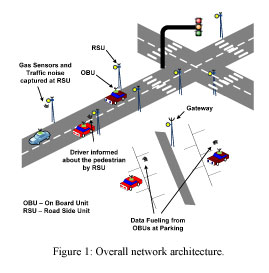
Hafiz Malik, assistant professor of electrical and computer engineering at UM-Dearborn, is ready to begin work on an internationally collaborative project that will assess the severity of environmental pollution and conditions in the Pakistani city of Lahore.
Malik, who previously lived in Lahore, is partnering with colleague Muhammad Tahir, assistant professor of electrical engineering of the University of Engineering and Technology (UET) Lahore, to monitor air quality in Pakistan's second largest city using an integrated secure wireless sensor and vehicular network.
The three-year project was one of only 28 selected proposals from among a pool of 270 proposals submitted to be part of the Pakistan-U.S. Science and Technology Cooperation Program, funded by the U.S. Department of State and the Pakistani Higher Education Commission.
 As their proposal explains, swift growth in the number of vehicles on Pakistan roads is the prime source of ambient air pollution in the country's big cities. A United Nations survey conducted for the city of Lahore revealed a 400 percent surge in the number of vehicles on the city's roads in the last couple of decades. Any measures to address pollution-related issues will require an accurate estimate of the pollutants in the air to reveal the gravity of the situation.
As their proposal explains, swift growth in the number of vehicles on Pakistan roads is the prime source of ambient air pollution in the country's big cities. A United Nations survey conducted for the city of Lahore revealed a 400 percent surge in the number of vehicles on the city's roads in the last couple of decades. Any measures to address pollution-related issues will require an accurate estimate of the pollutants in the air to reveal the gravity of the situation.
Malik and Tahir's research aims to assess the short- and long-term dangers of Lahore's air pollution on residents' health by monitoring and collecting data via secure sensor nodes attached to UET buses that will travel the city and relay data to roadside nodes.
Malik sees the project as an opportunity to better the environment, the health of Pakistani people and develop research possibilities that will motivate Pakistan students.
"Our job as educators and researchers is to give back to society," Malik said. "We hope this project will develop solutions that can apply to other environmental areas like soil monitoring and water quality assessment. We'll also be sharing knowledge and expertise to promote and improve research at Pakistan's higher education institutions, giving Pakistani students a chance to study at home instead of waiting to come to the U.S."




